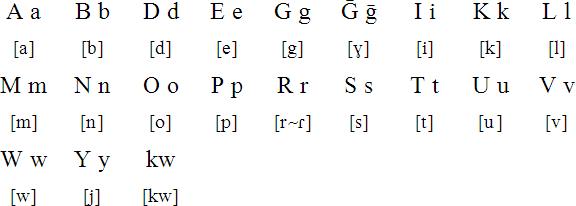Kakabai is a member of the Western Oceanic branch of the Malayo-Polynesian language family spoken in Milne Bay Province in Papua New Guinea by about 900 people (in 2003).

Information provided by Michael Peter Füstumum
Mwanuwa labu isedi Koka bi Duwaga. Koka wapumo imodina i saḡasaḡa bi Duwaga oyamo i modina i yovoyovo. Etamo ai tau banava te daibi a voiedi. Koka ena daibi i voie i koiyada bi i wadiwadi. Bi Duwaga ena daibi i voie i kausolu bi i wadiwadi.
Koka iwai kita saḡa Duwaga i kita i kaukausolu te i giu, "tam bai kwa kaukauwe, kwa kaka dubadubam", kota Duwaga i kita yovo Koka i kita i koikoiyada te i giu yovo, "tam bai kwa kaka sabasabam?". Niganana wapu doḡana sabasabana bi oya doḡana dubudubana. Wapu sa daibi bi gidevina sa yada bi sa wadi, oya lavedi niganana sa daibi te sa gabukaue sa kausolu bi doḡa kalakalatinemo sa wadi kaka ye laubani kauwa. Niga titikuna koiyada bi kausolu damona.
There were two birds named Koka and Duwaga. Koka was going up the mountain from the flat land and Duwaga was coming down. They met on the way and made a new garden. Koka made the new garden and cleared it and was planting. (At the same time) Duwaga made a new garden and cleared it and was planting.
Koka looked up and saw Duwaga clearing the garden and said to him, "What are you doing, you are making yourself all black (dirty)." And Duwaga looked down and saw Koka cleaning his new garden and called down to him, "Koka why are you making yourself all red?" That is why now the earth on the flat land is red and the earth on the mountain is black. (So now) when people make a new garden in the flat land, they only clear the green plants (without burning it) and they plant. Now the mountain people burn their new garden properly, clean it, and plant and will reap a good harvest. This is the end of the story of two ways of making a garden.
Source: Kakabai Organised Phonology Data (OPD)
Information Kakabai | Tower of Babel in Kakabai
Information about the Kakabai language
https://en.wikipedia.org/wiki/Kakabai_language
https://www.ethnologue.com/language/kqf
https://www.sil.org/language/kqf
Adzera, Ahamb, Äiwoo, Aneityum, Apma, Araki, Are, ’Auhelawa, Avava, Babatana, Bariai, Bola, Big Numbas, Buhutu, Bwaidoka, Caac, Cheke Holo, Dorig, Hiri Motu, Hiw, Hoava, Kakabai, Kaninuwa, Kokota, Kove, Kurti, Lakon, Lehali, Lenakel, Lewo, Lote, Lo-Toga, Löyöp, Manam, Marovo, Maskelynes, Mato, Mavea, Mono-Alu, Motu, Mussau-Emira, Mwotlap, Nafsan, Nahavaq, Namakura, Nanggu, Nduke, Neve‘ei, Neverver, Ninde, North Efate, Nume, Paamese, Papapana, Raga, Rotuman, Roviana, Sa, Sakao, Saliba, Siar, Sio, Ske, Sobei, Sursurunga, Tamambo, Tami, Teanu, Tigak, Tirax, Tolai, Touo, Ubir, Ughele, Uneapa, Vatlongos, Vitu, Vurës, Western Fijian, Yabem, Yapese
Languages written with the Latin alphabet
Page last modified: 31.10.22
[top]
You can support this site by Buying Me A Coffee, and if you like what you see on this page, you can use the buttons below to share it with people you know.

If you like this site and find it useful, you can support it by making a donation via PayPal or Patreon, or by contributing in other ways. Omniglot is how I make my living.
Note: all links on this site to Amazon.com, Amazon.co.uk
and Amazon.fr
are affiliate links. This means I earn a commission if you click on any of them and buy something. So by clicking on these links you can help to support this site.
[top]